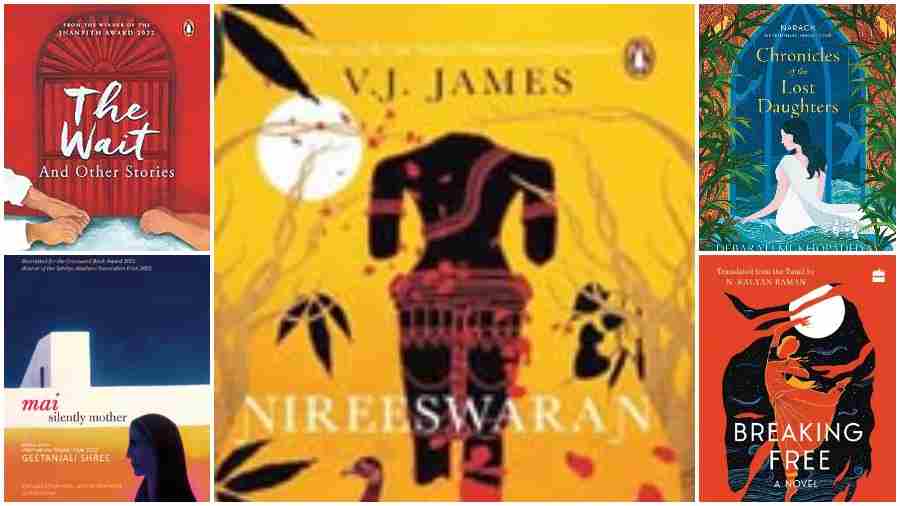The Wait by Damodar Mauzo, translated from Konkani by Xavier Cota (Penguin India)
2022 Jnanpith Award winner Damodar Mauzo lives in Goa and writes in Konkani. His collection of short stories have been translated to English by Xavier Cota in a book titled The Wait and Other Stories. Throwing light on a contemporary Goa that is very far from the holidaying tourists and resorts that is a part of the popular narrative, he writes of village conflicts, emotional extremes exploring desire, loss and love; complicated relationships like that of a writer and a thief who has broken into his house. Mauzo’s stories will now reach a larger audience who need to wrench their attention away from polarising religious opinions to think of a world of co-existence. Community forms a large part of Mauzo’s narrative who was also awarded the Sahitya Akademi Award in 1983, for his novel Karmelin, and the Vimala V. Pai Vishwa Konkani Sahitya Puraskar in 2011, for his novel Tsunami Simon.
Nireeswaran by V.J. James, translated from Malayalam by Ministry S. (Penguin India)
A religious satire from the award-winning novelist V.J. James, Nireeswaran is the perfect blend of humour and social awareness that makes for fine literature. It traces the story of three atheist friends — Antony, Sahir and Bhaskaran — who decide to play an elaborate prank to prove the inefficacy of religious beliefs of villagers. They install a mutilated idol of Nireeswaran (anti-god) to prove the hollowness of religion. However, soon miraculous events in the village are attributed to this creation that was born solely from imagination. James questions the very idea of belief and disbelief in an effort to prove the unavoidable connection between the two. James’ debut novel Purappadinte Pusthakam was awarded the DC Silver Jubilee Award (1999), Malayattoor Prize and Rotary Literary Award. He is also the recipient of awards like Kerala Sahitya Akademi Award, Basheer Puraskaram and Vayalar Award to name a few.
Chronicles of the Lost Daughters by Debarati Mukhopadhyay translated from Bengali by Arunava Sinha (HarperCollins Publishers)
In an effort to build a fictional tale highlighting ‘lesser-known facts of Bengal’, Debaroti Mukhopadhyay wrote her novel Narach in Bengali. Set in 19th century Bengal, the novel with a colourful cast even sees the appearance of stalwarts like Rabindranath Tagore, Kadambini Ganguly and Nawab Wajid Ali Shah. Tying together narratives of three very different characters in very different circumstances, Chronicles of the Lost Daughters tells the tale of young widow Bhubonmoni, idealistic young rebel Shourendro and shy musician Chondronath. How the three characters have their fate align for a meeting, this book is a story of courage, betrayal, love and loss. Mukhopadhyay is also the author of more than 20 bestselling novels including Narach, Dakatraja, Glanirbhabati Bharat, Shikhandi, Ishwar Jakhan Bandi, and Aghore Ghumiye Shiva.
Breaking Free by Vaasanthi, translated from Tamil by N. Kalyan Raman (HarperCollins Publishers)
A stunning account of three generations of women, Breaking Free is feminist prose at its fictional best. Vasanthi writes about devadasis or servants of Gods who dance in front of the idols. Through the stories of two devadasis Kasturi and Lakshmi, she looks at society’s treatment of women in their vocation. While Kasturi is happy to worship at God’s feet, Lakshmi wants to get an education and become a doctor. Vasanthi writes about Lakshmi’s father’s secret visits to their house while refusing to acknowledge her presence in public. Lakshmi and Kasturi’s friendship is seen to suffer with their different ambitions and yet have their futures merge under difficult circumstances. Beautifully translated by N. Kalyan Raman, this is a Tamil masterpiece’s arrival on a larger stage.
Mai: Silently Mother by Geetanjali Shree, translated from Hindi by Nita Kumar (Niyogi Books)
Geetanjali Shree made history by winning the International Booker Prize this year for her translated novel Tomb of Sand. Her first novel Mai: Silently Mother has now been translated by professor of South Asian History at Claremont McKenna College, California, Nita Kumar. Kumar has won the Sahitya Akademi Award in translation this year for this particular book. Based on the lives of people in a north Indian family, Shree writes about three generations of women with conflicting ideas and shared trauma. Sunaina, the daughter of the house, is adamant to not be like her mother Mai who she perceived as abused and weak. She tries imposing her idea of freedom on her mother, redefining in her mind her understanding of the word. A wonderful new perspective on lived experiences and their different outcomes on different people, this is a poignant tale worth every bit of attention.
